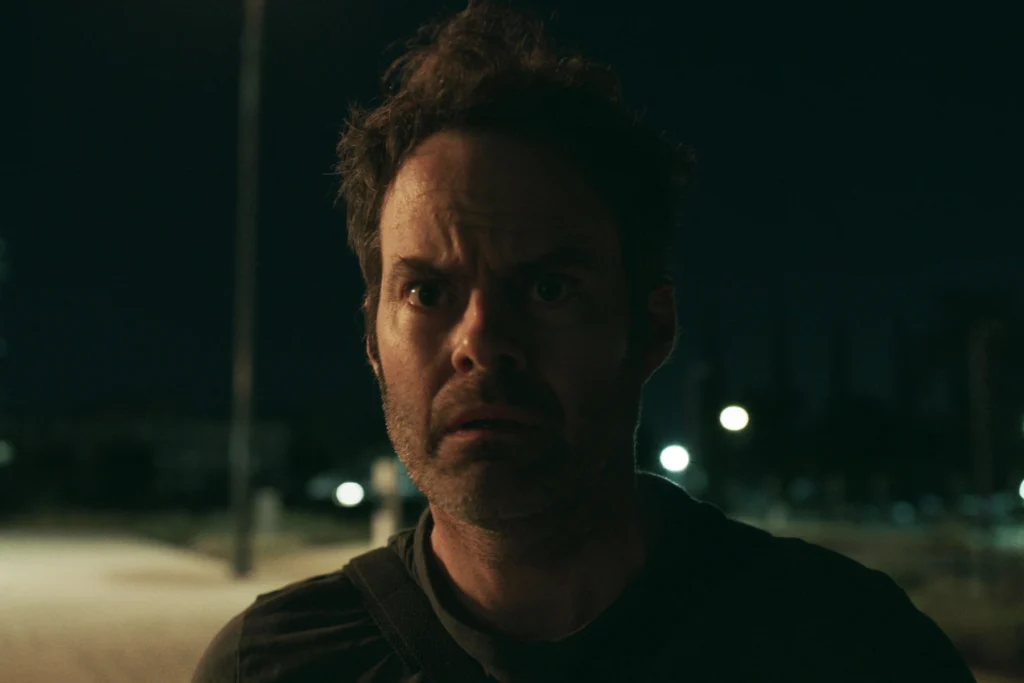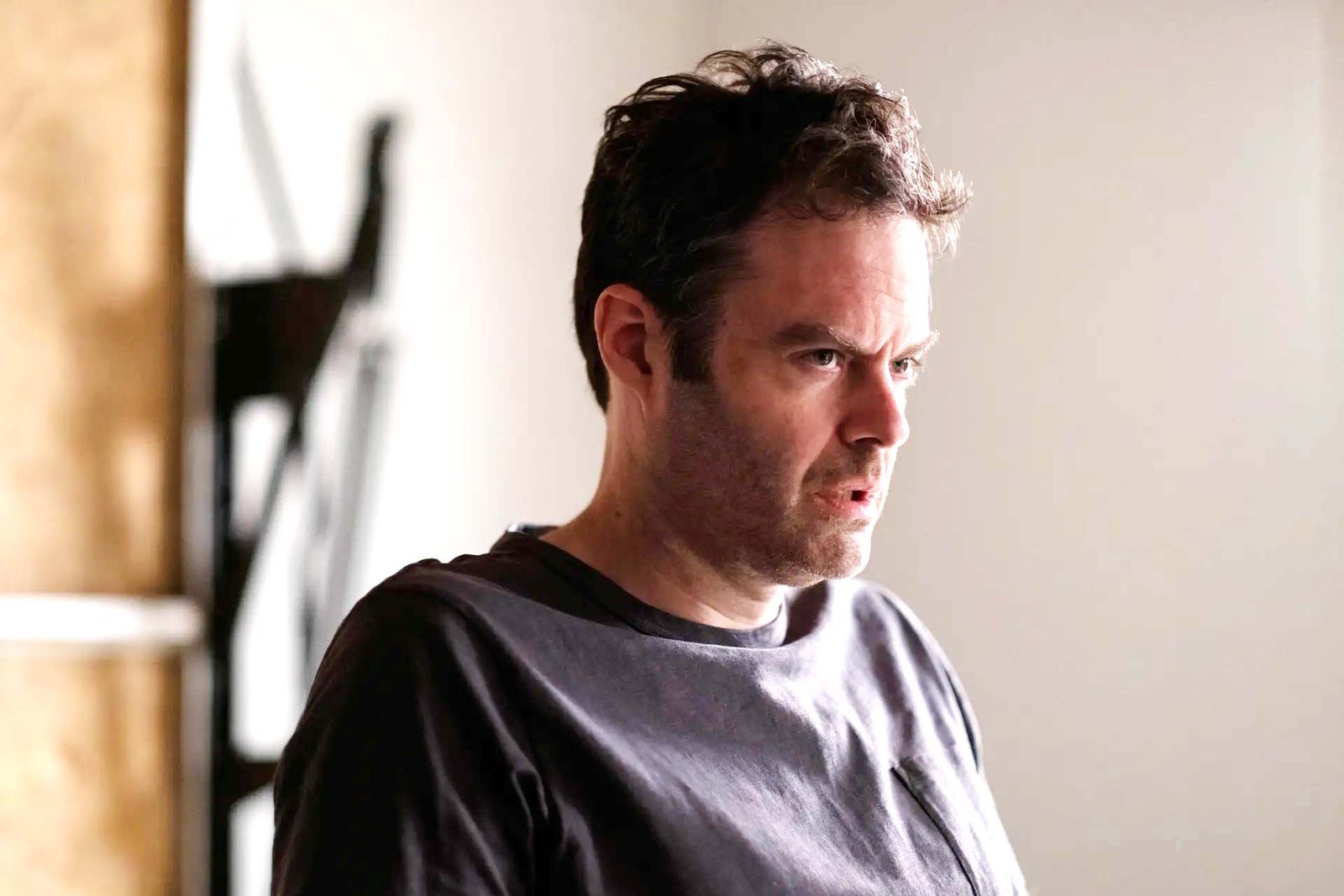Barry Finale Review : In a poignant moment before confronting the gangsters who have kidnapped his family, Barry Berkman, portrayed by Bill Hader, takes a moment to reflect in the parking lot. With a sense of impending doom, he prays, seeking the strength to sacrifice himself for the safety and well-being of his son, John. Barry yearns for redemption, hoping that by making this ultimate sacrifice, his sins will be absolved, allowing him a rightful place in the kingdom of heaven. However, fate takes an unexpected turn, and the encounter he anticipates never materializes. Fuches, played by Stephen Root, brings John unharmed to Barry and disappears without a word. Rather than relief, Barry’s face registers disappointment. Dying for his son would have provided a straightforward path to martyrdom, a role he desires for himself.
Throughout the series, Barry has been consumed by the stories he tells himself about his own identity. Despite being a contract killer with an ever-increasing body count, Barry clings to the illusion that one more fresh start could redefine him as a savior, a protector, a good man with a clean slate. This delusion drives him, causing him to obsess over Cousineau’s storytelling and present his son with a sanitized version of his past in Afghanistan. It is also what initially drew him to Hollywood—an industry built on selling captivating fabrications.
However, “Barry” goes beyond upholding these illusions. Instead, the show continually punctures them, exposing the gap between true atonement and the shallow, made-for-TV version of redemption. Throughout the series, Barry’s attempts at seeking forgiveness have been flawed. Rather than truly owning up to his actions, he resorts to showering Gene with money and professional opportunities.
Even in the finale, Barry’s quest for atonement remains flawed. The morning after narrowly escaping death, he decides to turn himself in for the murder of Janice. Notably, he was not initially motivated to do so when Sally urged him earlier, warning that Cousineau might be implicated instead. It is only when Barry finds himself backed into a corner—with Sally and John mysteriously gone and Tom pleading that only Barry can save Cousineau—that he finally relents.
However, in a final twist, Barry denies himself the opportunity to play the hero. Before he can confess, he instructs Cousineau to kill him. Barry yearns for a dramatic end, a death in a blaze of Chechen gunfire or a swarm of police, fitting for the white knight he desperately wants to believe himself to be. Instead, his moral reckoning delivers an unceremonious and unworthy demise. After Cousineau’s first shot wounds him in the shoulder, Barry remarks, “Oh, wow,” with no time to say more before Cousineau’s second and final shot to his head.
Barry’s denial is not unique. Throughout the fourth season, Noho Hank, portrayed by Anthony Carrigan, also grapples with his own form of denial. Previously a lovable gangster, he sacrifices his boyfriend’s life to ensure his own safety. But even when compelled at gunpoint by Fuches to admit to killing Cristobal, Hank, now a savvy businessman, cannot face the truth. In the end, he bleeds out while clutching the hand of a statue erected as a tribute to his lost love, unable to confront the depth of his own betrayal.

Yet amidst the bleakness, “Barry” still offers glimmers of hope that truth can bring freedom. Ironically, it is Fuches’ acceptance of himself, acknowledging that he is a man without a heart, that allows him to spare Barry and release John. Understanding the pain he caused Barry, Fuches chooses to break free from the cycle of revenge and manipulation that has bound them for so long. Similarly, Sally’s confession to John about her true identity and past actions empowers her to leave Barry for good. In a bittersweet ending, a time jump reveals Sally as a beloved high-school drama teacher, breaking free from personal abuse and professional rejection that once defined her life.
However, even in this future, “Barry” delivers a final, dark twist. In the closing minutes of the series, a teenage John watches a true-crime thriller called “The Mask Collector,” which portrays Gene as the villain responsible for the murders of both Barry and Janice, while Barry is depicted as the noble hero laid to rest in Arlington National Cemetery. It is a lazy and inaccurate portrayal, far removed from the complex characters and their painful journey toward absolution. Yet, it is the kind of story that Hollywood loves to tell, the kind of story Barry himself would have wanted. Judging by John’s subtle smile, it is evident which version of the story is likely to stick.
In some ways, the finale of “Barry” can be vexing. Barry’s death feels anticlimactic, Hank’s demise heartbreaking but lacking catharsis, and Sally’s seemingly mundane life after enduring so much chaos and turmoil. Gene faces an unjust prison sentence, while Janice never receives true justice. John remains a somewhat undefined character, a representative of the next generation. Tonally, the fourth season of “Barry” has veered away from the absurdist showbiz satire of its earlier episodes, potentially alienating fans who were drawn to the series for its droll humor.
However, these frustrations align with the show’s evolution into an earnest exploration of the impossibility of redemption. “Barry” is a profound self-reflection, a departure from the easily digestible narratives of “The Mask Collector.” The series recognizes the comforting stories we tell ourselves and, in its final half-hour, refuses to become one of those stories.
“Barry” teaches us that true redemption is not easily achieved or neatly packaged. It requires genuine self-reflection, accountability, and the willingness to face the consequences of our actions. It reminds us that the pursuit of redemption is a complex and painful journey, far removed from the simplistic narratives often perpetuated by the entertainment industry. Ultimately, “Barry” leaves us with a sense of unease, challenging us to grapple with the uncomfortable realities of our own lives and the narratives we construct to make sense of them.
Q1: What is the plot of the TV series “Barry”?
A1: “Barry” follows the story of Barry Berkman, portrayed by Bill Hader, a contract killer who, in a moment of reflection, seeks redemption and sacrifices himself for the safety of his son. Throughout the series, Barry grapples with his identity, yearning for a fresh start and clinging to illusions of being a savior. However, his attempts at atonement are flawed, and the show exposes the gap between true redemption and the shallow version portrayed in the entertainment industry.
Q2: What motivates Barry to turn himself in for murder?
A2: Barry decides to turn himself in for the murder of Janice when he finds himself backed into a corner, with Sally and John mysteriously gone and his mentor, Cousineau, in need of saving. It is a combination of desperation and a sense of responsibility that compels him to take this action.
Q3: How does Barry’s moral reckoning ultimately unfold?
A3: In a final twist, Barry denies himself the opportunity to play the hero and instructs Cousineau to kill him instead of confessing. Barry’s desired dramatic end and martyrdom do not materialize, as he receives a gunshot wound in the shoulder followed by a fatal shot to the head from Cousineau.
Q4: How does “Barry” explore the theme of denial?
A4: Throughout the series, both Barry and Noho Hank grapple with their own forms of denial. Barry, despite being a contract killer, clings to illusions of being a good man and obsesses over storytelling and fabrications. Noho Hank, once a lovable gangster, cannot face the truth of his own actions, even when compelled to admit them at gunpoint. The show highlights the consequences and limitations of denial in their respective journeys.
Q5: What does “Barry” teach viewers about redemption?
A5: “Barry” emphasizes that true redemption is a complex and painful journey that requires self-reflection, accountability, and facing the consequences of one’s actions. It challenges simplistic narratives often perpetuated by the entertainment industry and reminds viewers that redemption is not easily achieved or neatly packaged. The series leaves viewers with a sense of unease, encouraging them to confront the uncomfortable realities of their own lives and the narratives they construct.
Q6: How does Fuches contribute to Barry’s journey towards redemption?
A6: Fuches, portrayed by Stephen Root, plays a significant role in Barry’s journey towards redemption. In a poignant moment, Fuches accepts himself as a man without a heart, acknowledging the pain he caused Barry. This self-acceptance allows him to spare Barry’s life and release John, breaking free from the cycle of revenge and manipulation that had bound them. Fuches’ actions serve as a catalyst for Barry to confront his own demons and seek a path towards true redemption.
Q7: How does Sally’s confession impact her character arc in “Barry”?
A7: Sally’s confession about her true identity and past actions empowers her to break free from Barry and leave him for good. In a bittersweet ending, a time jump reveals Sally as a beloved high-school drama teacher, having overcome personal abuse and professional rejection. Her confession serves as a transformative moment, enabling her to forge a new and healthier path for herself.
Q8: Does the finale of “Barry” provide a satisfying resolution for all characters?
A8: The finale of “Barry” can be vexing and might not provide a satisfying resolution for all characters. Barry’s death feels anticlimactic, Hank’s demise lacks catharsis, and Sally’s seemingly mundane life after enduring chaos and turmoil might disappoint some viewers. Gene faces an unjust prison sentence, and Janice does not receive true justice. The fourth season veers away from the earlier droll humor and offers a more introspective exploration of redemption, potentially alienating fans who were drawn to the show for its satirical elements.
Q9: What is the underlying message conveyed by the series “Barry”?
A9: “Barry” serves as a profound self-reflection, challenging comforting narratives we tell ourselves. It explores the complexities of redemption and highlights the gap between true atonement and the shallow version often depicted in the entertainment industry. The series emphasizes the importance of genuine self-reflection, accountability, and facing the consequences of one’s actions on the journey towards redemption. It encourages viewers to grapple with the uncomfortable realities of their own lives and the narratives they construct to make sense of them.

